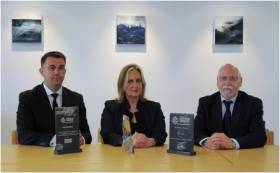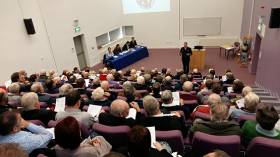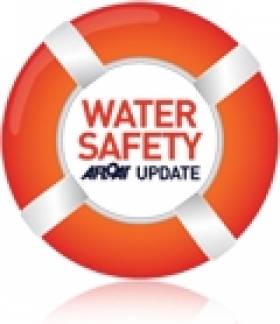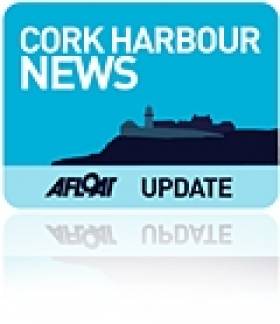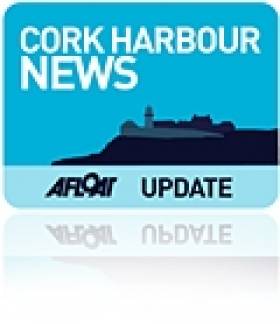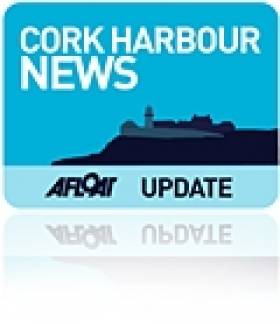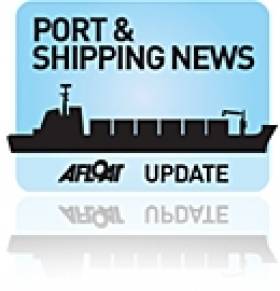Displaying items by tag: NMCI
National Maritime College of Ireland Recognised for Consistency in Academic Excellence
At the 2016 Irish Logistics and Transport Award ceremony, the National Maritime College of Ireland (NMCI) were, for the third year in succession, recognised for their excellence in educational programmes, and were awarded the prestigious Education award for their Bachelor of Business degree in Supply Chain Management. This annual gala event in Dublin, attended by over five hundred delegate representatives from the supply chain and logistics management sector, gathered to celebrate the best of what their industry has to offer. Jane O’Keeffe, course director of Supply Chain, proudly collected the award on behalf of the NMCI.
NMCI is a constituent college of Cork Institute of Technology (CIT) and focuses on both maritime and non-maritime industry sectors, and offers customised education and training programmes to meet individual requirements. The Bachelor of Business in Supply Chain Management degree programme is designed to support industry requirements, and for those with experience in logistics and supply chain management, who wish to further their career prospects.
This unique programme, in its ninth year, builds upon the students’ experiential knowledge and provides grounding in a wide and diverse range of disciplines. To date graduates have experienced excellent employment and career progression opportunities in both indigenous and multi-national organisations. The programme has been so successful within the logistics and supply chain industry nationally, that it is proposed to incorporate modules in logistics and supply chain into the bachelor degrees in Nautical Science, Marine Engineering and Marine Electro-technology at the NMCI. This is in keeping with the current best practice throughout the Maritime colleges in Europe and globally. Currently the Supply Chain degree programme is being developed as Level 8 offering through the CAO system.
The Government Future Skills Needs publication in 2015 highlighted Freight Transport, Distribution and Logistics (FTDL) sector in Ireland as a significant growth area for the period 2015-2020, and programmes such as those on offer at the NMCI are currently seen to address the opportunities highlighted at middle management level within the sector. A review of the skills gap in Ireland concurred with international best practice in identifying common skills development and talent attraction issues. The NMCI is appropriately positioned to support logistics and supply chain education and job creation, as in excess of 90% of global trade by volume is transported by sea. This is an indication of the importance of logistics to the maritime industry and of even greater importance to Ireland where 98% of trade by volume comes through its seaports. The NMCI facility, which embraces advanced technologies including simulation in its programmes, is ready to meet the growing demand in best in class logistics and supply chain education and training.
Ireland is an island nation but not yet a maritime nation. So said Capt. James Robinson of the Irish Maritime Forum and formerly of the Irish Naval Service when opening the Forum's conference at the National Maritime College in Ringaskiddy, Cork Harbour, this morning. Attendance at the one-day conference 'Maritime Aspects of the 1916 Rebellion' has been fully booked-out. It is examining the influence of sea power on the rebellion, including the Aud and the Helga. People are attending from all over the country.
'Tested on Humans' Duo Face Lifeboat Freefall & Helicopter Escape At NMCI
#NMCI - The National Maritime College of Ireland features on tonight's episode of RTÉ 2's new TV series Tested on Humans.
Tune in at 9pm this evening (Monday 14 December) to see presenters Claire Tracey and Keith Walsh find out what it's like to escape from a simulated helicopter crash underwater.
On their recent visit to the college's €90m training facility in Cork Harbour, the duo also faced the freefall lifeboat drop – a standard test for all modern ships but a challenge to beat any extreme theme park ride.
See more of Claire and Keith's antics testing their minds, bodies and nerves on RTÉ Player.
Safety At Sea International Conference Held In Cork
Delegates from 18 countries are attending an international conference on safety at sea in Cork where it has been revealed that, since the sinking of the cruise ship Costa Concordia, the main problem encountered during ship inspections has been with abandon ship and fire drills.
It is the 10th conference of the International Association for Safety and Survival Training – IASST – whose Chairman, Dmitrus Semjonovs, said that continuous research was being done by the organisation to improve safety at sea and advance the saving of lives by promoting safety and survival training.
The Chief Surveyor of the Irish Maritime Administration, Brian Hogan, said that encouraging personal responsibility for everyone at sea, from commercial to leisure, should be the main focus of maritime safety strategy.
The conference is being held at the National Maritime College in Ringaskiddy where the co-ordinator, Capt.Cormac MacSweeney, said that over the two days of discussions, response to emergency situations, from offshore operations to various aspects of shipping and small craft would be discussed. “Survival training is essential to safety at sea and that is vital to everyone who goes to sea.”
Annual Forum Reflects on Irish Maritime Industry
#IrishMaritimeForum - The Irish Maritime Forum held last Friday was the place to be as more than 150 attendees where at the annual event at the National Maritime College of Ireland (NMCI) in Ringaskiddy.
The forum which was both hosted and organised by the NMCI looked at “Success through Synergy – an innovative and dynamic approach to the future”. The event had welcomed both organisations and maritime professionals operating in the broad Maritime Industry in Ireland.
The event was officially opened by John Mullins (Chairman, Port of Cork) before Simon Coveney, Minister of State for Agriculture, Food and the Marine, and Defence took to the stage to discuss the importance of the Maritime Industry to Ireland’s economic recovery and how "solutions to a number of the World's great challenges will come from the sea".
Having recently attended the Ploughing the Minister mentioned “how SeaFest (Maritime Festival) will become to maritime what the Ploughing Championships are to agriculture".
Setting the scene for the speakers Fergal O’Brien (IBEC) spoke about the Irish Economy and how we have gone from boom, to bust to recovery.
Liam Lacey, Director of the IMDO, took to the stage to discuss Ireland’s maritime potential, trends in the international shipping industry, and the Irish Tonnage tax system.
Jonathan Healy, MC for the event, then interviewed five key industry leaders in a Maritime Skills Panel Discussion; Rory McGuire (Flagship Management), Conor Mowlds (Head of College), Kevin Richardson (President of the International Harbour Masters Association), Captain Dave Elliott (Arklow Shipping) and Cormac Gebreurs (Head of Halpin Centre for Research & innovation).
The Maritime Skills panel discussed the shortage of skilled personnel in the industry, what issues face the industry in terms of finding the right personnel, and how new legislation is affecting the industry in terms of recruitment.
Dave Ward, Commercial Service Manager with Commissioner of Irish Lights, who spoke about the Great Lighthouses of Ireland.
Dave spoke about the role CIL are taking in the development of all island Lighthouse Tourism Project which looks at Securing and Protecting Lighthouse Heritage while stimulating local economic development and employment in coastal communities.
NMCI To Host International IASST Meeting & Conference
#WaterSafety - The National Maritime College of Ireland, as a member of the International Association of Safety and Survival Training (IASST), be hosting the 67th International IASST Meeting & Conference on 19-20 October 2015 at the NMCI campus in Ringaskiddy.
Registration for the conference, which is also open to non-IASST members, is now live over on the IASST website. Full details on the conference agenda are available HERE.
Follow the NMCI on Twitter, LinkedIn and the official blog to keep up-to-date about the conference.
National Maritime College Of Ireland Wins Prestigious Award
#NMCI - The National Maritime College of Ireland (NMCI) in Cork Harbour has been recognised for its excellence at the 2015 Irish Logistics and Transport Awards for the second year in succession.
Taking the award for its Bachelor of Business degree in Supply Chain and Transport Management, the NMCI was also nominated for the overall Excellence in Logistics Award.
Jane O'Keeffe, director of supply chain at the NMCI, collected the award at an annual gala event in Dublin attended by over 400 delegates from the logistics and transport sector.
The NMCI, a constituent college of Cork Institute of Technology which last year celebrated its first decade in operation, focuses on both maritime and non-maritime industry sectors – with partnerships such as the Canary Islands' first Offshore Survival Training Centre – and offers customised education and training programmes to meet individual requirements.
The Bachelor of Business in Supply Chain and Transport Management degree programme is designed to support industry requirements for those with experience in logistics and supply chain management and those who wish to further their career prospects.
This unique programme, now in its eight year, builds upon the student's experiential knowledge and provides grounding in a wide and diverse range of disciplines.
To date, graduates have experienced excellent employment and career progression opportunities in both indigenous and multi-national organisations.
The NMCI says the programme has been so successful within the logistics and supply chain industry nationally that it is proposed to incorporate modules in logistics and supply chain into the Bachelor Degrees in Nautical Science, Marine Engineering and Marine Electro-technology.
The Government Future Skills Needs publication in February of this year highlighted the freight transport, distribution and logistics (FTDL) sector in Ireland as a significant growth area for the period 2015-2020. Programmes such as those on offer at the NMCI are seen to address the opportunities highlighted at middle management level within the sector.
The NMCI says it is ideally positioned to support logistics and supply chain education and job creation as in excess of 90% of global trade by volume is transported by sea.
This is an indication of the importance of logistics to the maritime industry, and of even greater importance to Ireland, where 98% of trade by volume comes through its seaports.
The NMCI facility in Cork Harbour, which the college says embraces advanced technologies including simulation in its programmes, is ready to meet the growing demand in best in class logistics and supply chain education and training.
#nmci – The National Maritime College of Ireland (NMCI), in Cork harbour, is the lead partner in the delivery of the Canary Island's first Offshore Survival Training Centre. A ceremony to mark the partnership will be held in Las Palmas on Friday next, March 27th, hosted by Conor Mowlds, Head of the NMCI, in the presence of the Spanish Minister for Industry, Energy and Tourism, Jose Manual Soria, and Ireland's Honorary Consul in Gran Canaria, Victor Aúz Castro.
The NMCI and SEFtec, one of the world's leading suppliers of offshore simulation equipment and training support consultancy, are the lead consultants and manufacturers for the design, manufacture, development and operation of the Grupo Stier Training Centre in Las Palmas. Expertise from the NMCI and SEFtec have combined to support the development and operation of this centre and are now recognised as world leaders in the sector.
Simon Coveney, TD, Minister for Marine, Agriculture and Defence said, "This is a fantastic example of how Ireland's public and private maritime sectors can work together to deliver manufacturing and consultancy services overseas, creating jobs and revenue for the country and promoting Irish niche-sector expertise on a global platform."
Grupo Stier, who will operate the Offshore Survival Training Centre, have had a presence in the Canary Islands since 1994. Its training arm, Centro de Estudios Marítimos del Atlántico (CEMA) offers practical and innovative training for the next generation of maritime professionals based on the island. For over 20 years CEMA has developed and delivered various programmes, and activities, with an emphasis on maritime studies. The company has trained more than 2,500 alumni from all over the world.
"This project is one of the most exciting we have been involved in, the professionalism and focus of the Group Stier Team is truly impressive and the location of the Training Centre is unequalled. We have committed the full resources and expertise of the NMCI in support of this fantastic initiative and we are proud to be associated with both Group Stier and the Canary Islands" says Conor Mowlds, Head of the NMCI (& MD SEFtec NMCI Offshore Ltd.)
"The NMCI is to the fore in maritime research in Ireland, making it a global leader," said Sean Sherlock, TD, Minister of State for Development, Trade Promotion and North-South Co-operation at the Department of Foreign Affairs.
"Our goal is to further develop a thriving maritime economy, enabling economic growth and creating jobs in our ocean economy. The work of the NMCI complements that goal. Projects like this in the Canary Islands strengthen international bonds and relationships that will lead to even further advancement in the years to come."
The Centre will be located in the Puerto de Taliarte, on land leased to it through a co-operation agreement with the Cabildo de Gran Canaria: it will be completed by April and fully operational by September 2015 providing approved offshore survival training in support of the Canaries growing offshore industry.
Ida Stier, CEO Grupo Stier said: "After 20 years providing training services in the shipping market, Grupo Stier is very excited to develop this project with the support of NMCI, SEFtec and the Cabildo/City Hall de Gran Canaria, as this will give the opportunity to train local people for the offshore business and will contribute to the Islands in the development of the offshore industry."
"It is always exciting to work with ground breaking companies who are willing to introduce new products and services" said Darren O'Sullivan, Director SEFtec, "It is my strong belief that the Canaries and the Oil gas sector will benefit greatly from Grupo Stiers investment and vision"
#nmci – This month sees the National Maritime College of Ireland (NMCI) celebrate ten years in operation and an event to commemorate 10 years of world class maritime education and training in Ireland will be led by the Minister for Marine & Defence, Simon Coveney, TD, on Friday, October 3rd.
Located in Ringaskiddy, Co. Cork, the NMCI, a constituent college of CIT, brings together the Irish Naval Service and Merchant Marine under one roof in one of the most advanced maritime academies of its type in the world.
The NMCI was the first third level college in the country to be built under the Government's Public-Private Partnership scheme. This model has allowed the college management and teaching staff to concentrate on education while the private partner, Cofely GDF Suez, has been responsible for services to the college and the maintenance of its facilities.
In addition to supporting the maritime education and training needs of the merchant, Naval, coastguard and emergency services, recent years have seen rapid growth of the NMCI's activities both at home and abroad. The expansion of the College's academic, commercial and research services have resulted not only in an enhancement of Ireland's international reputation in the field, but has supported the employment of thousands of Irish men and women in the maritime and offshore sectors.
An example of this industry currency and capability being the awarding recently to the College, by Chevron, of the largest maritime training contract in the history of state, bringing with it not just significant revenue for the College but the creation of jobs high end jobs for Irish nationals and revenue for local support services.
Conor Mowlds Appointed Head of the National Maritime College of Ireland
#nmci – Conor Mowlds has been appointed Head of the National Maritime College of Ireland. Conor has been Head of the NMCI's commercial operations for the last five years. He previously held posts in the UK & Ireland in technical ship management and business development, in both the public & private sectors.
Originally from Dublin, Conor is a graduate in Maritime Business & Law from Southampton and is a Chartered member of Institute of Logistics & Transport.

